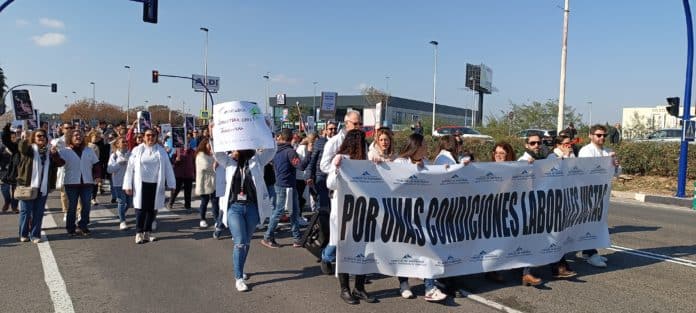On Saturday morning, medical staff from Torrevieja hospital, supported by members of the public, and councillors from Torrevieja, including the Mayor, Eduardo Dolón, took to the streets in protest over the way they feel they are being treated by the regional Ministry of Health, resulting in an estimated 3,000 protesting people reaching the town centre.
Despite working tirelessly throughout the peak of the Covid pandemic and dealing with considerable staffing issues caused by the reversal of private management at the hospital, the staff have finally had enough, after the Minister of Health, Miguel Mínguez, decided to try to end a collective agreement made with the staff when the hospital was still managed by the private company Ribera Salud. However, rather than consult with the workers, or enter into negotiations to change the working conditions, the Minister went straight to court to ask for the agreement to be annulled, angering the medical teams.
The result was that following a protest and vote at the hospital last week, the first strike in 20 years in public health was called due to the “borderline situation” they are experiencing and in protest against the permanent overload of care in consultations and the lack of doctors. Strikes were called for both March and April, the latter specifically targeting the busy Easter period, after two months of unsuccessful negotiations with the Ministry of Health and mutual reproaches for having broken contacts.
Faced with the threat of strike action, late last week, the Ministry of Health announced that it will withdraw the complaint in which it challenged the collective agreement.
Given the lack of communication and negotiation, the workers stated that it is still not enough for them to call off the strike, because “we do not trust the Ministry. Until we see the judicial order of withdrawal, we will continue as until now”, Fran García, representative of the working committee indicated.
In fact, rather than calming the situation, matters are escalating, and the protest march was subsequently called for Saturday, with the staff taking to the streets to demand they are treated fairly.
Moreover, colleagues and unions from across the region are now also wading into the argument, supporting the strikes, and the workers, urging the Ministry of Health to avoid this action “that requires improvement measures without further delay” by engaging in dialogue considering that a strike will harm patients and doctors.
In this sense, the collegiate medical entity of the province of Alicante regrets that after two months of negotiations an agreement has not been reached and insists that it will always be in favour of improving the working conditions and clinical practice of the collegiate so that they can provide health care of the highest quality and with guarantees to the public; despite which it shows its concern at the call for a strike in public health.
The College of Physicians shares the demands of the Medical Union, considering it essential to strengthen the staff at all levels of care (Primary Care, Hospital and Emergency) in the face of delays and waiting lists.
For this reason, it asks the Ministry of Health to re-establish negotiations to avoid strikes and makes itself available, once again, to collaborate in all initiatives that improve the health service and the practice of medicine in the Community.
On behalf of the Generalitat, Vice President Aitana Mas has indicated that the Consell will continue to try to seek solutions to the needs claimed by doctors.
Mas has highlighted that the Minister of Health, Miguel Mínguez, has sat down with all the unions in each of the calls to listen to the needs and put on the table what can be the solutions to the demands of the Medical Union. The vice president points out that it is essential that the dialogue between the parties continue to be open, but at the same time she has urged putting aside unilateral decisions and continuing “with active listening” and has called for responsibility.



















